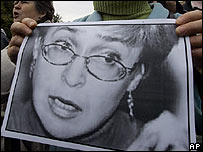Do we want to be Anna Politkovskaya?

I'll admit it--I hadn't heard of Russian investigative journalist Anna Politkovskaya until last weekend, until after she was already dead.
On Saturday, in broad daylight, a man wearing a baseball cap and carrying a gun followed Politkovskaya into her Moscow apartment building. As she stepped into the building's elevator, the man shot the journalist, tossed the gun next to her body, and fled.
The murder was big news in Russia and slightly less big news here in the U.S., but apparently, it's nothing new in Putin-era Russia. Next to it's web story on Putin's reaction to the news--he reportedly told President Bush that Politkovskaya's death was "tragic"--the BBC posted a scary infographic listing similar violence against Russian journalists in recent years. (Click here to see the story.)
According to Washington Post columnist Anne Applebaum, in life, Politkovskaya had been " proof...that there is still nothing quite so powerful as the written word." The Russian reporter had been one of the few to continue writing and criticizing the conflict in Chechnya, even when doing so became increasingly dangerous.
She won journalism awards, but was arrested. She sold papers, but was poisoned, allegedly by Russian officials trying to cut off her critical words. This time, somebody succeeded--it is widely believed that her death was a contract killing by one of the many individuals or organizations against whom she bravely stood up.
Politkovskaya was clearly a remarkable journalist and individual, the kind that most of us somehow want to be. We want to be the ones that go for the toughest stories, the ones that need to be told, the ones that could get us in trouble.
We get reminders all the time: 107 journalists have been killed since the U.S. began military action in Iraq in early 2003. Sixty-two were killed in the Balkans, and 49 in Rwanda. In Ireland in 1996, journalist Veronica Guerin was shot to death in her car by drug dealers she'd written about in the newspaper. In the Netherlands last year, the filmmaker Theo Van Gogh was stabbed and shot in broad daylight after his film about women in Islam was shown on television.
The list goes on and on. And the question is this: does it take a certain kind of person to want to be this kind of reporter? Or is it a certain issue that turns timid journalists into the kind of person will to risk everything to tell a story? And what stories are worth so much?
The link to Anne Applebaum's column is here.
...and the link to the International Press Institute's "Death Watch" on journalists is here.
-EG

4 Comments:
Maybe that is something a person would know until in the situation. Would I able to be like her? At first I would say now, but when faced with a situation, who knows what I would or could do. I think it sounds like a question of something deeper and maybe even unknown until the moment.
Great question. As I read this week's articles about journalists being killed in Afghanistan, I thought, there is no way I would put myself in that kind of danger to tell those stories. I believe the stories need to be told, but it is not my calling.
That being said, I had a very different reaction when I first learned about Ida B. Wells, who risked her life in the 1890s to report about lynching in the South. I hoped that if I were alive at the time I would have the courage to do what she did. So I guess as journalists, we all have our story or issue, the one that calls us to action, the one we would risk injury to tell. Thankfully, most of us aren't put in that position. But I think the fact that we feel that passionately about telling a story and holding the government accountable is what makes us journalists.
You pose a number of interesting questions and pair them with unsettling statistics, making them only more difficult to answer.
Journalists fire up when they are at the center of a big story or cover packages that others in the industry would be too afraid to tackle. I think that's why so many journalists are attracted to war zones. They want to tell stories that others are not brave enough to tell.
Personally, I want to be a reporter so I can give a voice to people who would normally never be on TV. I want to tell those stories, otherwise untold. Passion and drive push people like me to new levels. I think journalists learn new things about themselves with every story they cover. I also think it's too difficult to predict how a person would act if faced with those circumstances previously mentioned. I think you need to be in the enviornment, interacting with your sources, to really know what you would do and how you would do it.
Risking danger to tell a story is a challenge more and more journalists come and are willing to face in the midst of war, terrorist attacks and natural disasters.
The tragedy that sometimes results from their bravery is heartbreaking. But their courage and journalistic integrity are remarkable.
-JG
Anna Politkovskaya's life proves that there truly is power in the pen.
Post a Comment
<< Home